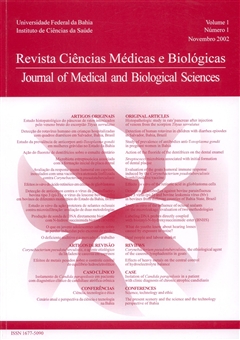Detection of human rotavirus in children with diarrhea episodes in Salvador, Bahia, Brazil.
DOI:
https://doi.org/10.9771/cmbio.v1i1.4042Keywords:
Rotavírus humano, diagnóstico, eletroferotiposAbstract
Acute infantile diarrhea is an important problem in public healthcare and Rotaviruses are responsible for about 20-40% of the cases of severe dehydrating diarrhea in children at 0-5 years old. In this work, we have analyzed diarrheic feces from children at 0-4 years old hospitalized between October 1998 and December 1999, in Salvador, Bahia, Brazil. In order to detect rotavirus, the samples were analyzed by ELISA (Test-Pack Abbot) and SDS-PAGE tests. The results demonstrated that from the 217 samples tested, 76 (35%) were positive, 127 (58,5 %) were negative and 14 (6,5%) diverged in both tests. The positive samples analyzed by SDS-PAGE test revealed the group A rotavirus and they were classified as short eletropherotypes (Subgroup I) and long eletropherotypes (Subgroup II).Downloads
Download data is not yet available.
Downloads
Published
2002-07-01
How to Cite
Campos, G. S., Sardi, S. I., Sampaio, A. S., & Mello, V. B. B. de. (2002). Detection of human rotavirus in children with diarrhea episodes in Salvador, Bahia, Brazil. Journal of Medical and Biological Sciences, 1(1), 7–11. https://doi.org/10.9771/cmbio.v1i1.4042
Issue
Section
ORIGINAL ARTICLES
License
The Journal of Medical and Biological Sciences reserves all copyrights of published works, including translations, allowing, however, their subsequent reproduction as transcription, with proper citation of source, through the Creative Commons license. The periodical has free and free access.


